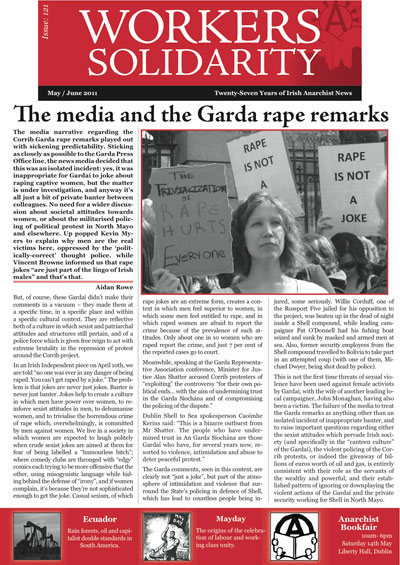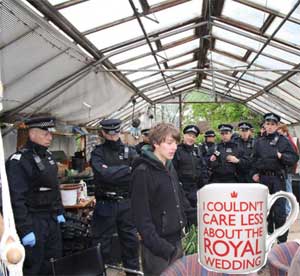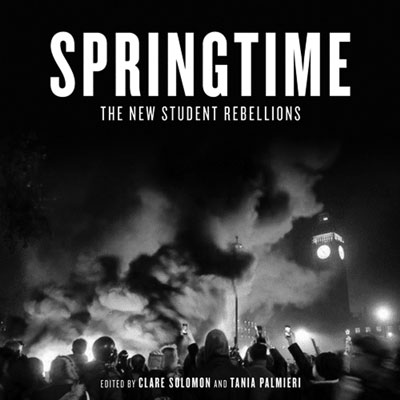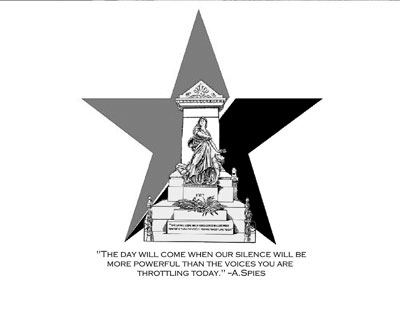Over 30 years of anarchist writing from Ireland listed under hundreds of topics
Cork: Film Night: Made in Dagenham (2010), Wednesday 4th May, 8pm @solidaritybooks
Workers Solidarity 121

May - June 2011 Edition of the Workers Solidarity freesheet.
PDF of Workers Solidarity 121 Web Edition 3.73 Mb
Thinking About Anarchism: The State
Ecuador: Oil, Rainforests & the challenge of climate change
Review: Springtime, the New Student Rebellions
A Day out of the Ordinary! The Dublin Anarchist Bookfair 2011
Review: Democratic Left: The Life and Death of a Political Party
The media and the Garda rape remarks
PDF of Workers Solidarity 121 Web Edition 3.73 Mb
Thinking About Anarchism: The State
Anarchists are those socialists who are anti-authoritarian, who place great stress on liberty and workers’ control. For this reason, we want to abolish the state at the same time as we abolish the division of society into a boss class and a working class.
The British royals - outdated, anti-democratic & unwelcome
 As Gardaí go door to door in central Dublin trying to intimidate any residents who might be tempted to protest against the visit of the British queen, their colleagues in Britain have mounted raids on social centers and squats across London. Five social centers were raided this morning in London and over 60 anarchists have been banned from the centre of the London on the day of the wedding of Liz's parasitic offspring. Cops used battering rams to raid 3 further houses in Hove.
As Gardaí go door to door in central Dublin trying to intimidate any residents who might be tempted to protest against the visit of the British queen, their colleagues in Britain have mounted raids on social centers and squats across London. Five social centers were raided this morning in London and over 60 anarchists have been banned from the centre of the London on the day of the wedding of Liz's parasitic offspring. Cops used battering rams to raid 3 further houses in Hove.
Review: Springtime, the New Student Rebellions
 The autumn and winter of 2010 saw the sudden and dramatic re-emergence of radical student movements, with mass student uprisings taking place across Europe and the United States in opposition to both the austerity measures being levelled against ordinary people as a result of the crisis in capitalism, and the neoliberal restructuring of education according to the needs of capital. Across the Western world, governments are introducing measures to transform universities into “factories of precarious workers” - institutions devoted to the production of graduates equipped with the skills and ideas desired by industries increasingly reliant on immaterial and mental labour, turning ideas into profits. These employees must be willing to work in increasingly precarious situations, either entirely unpaid, or for increasingly low wages on increasingly short-terms contracts – a transformation that is increasingly meeting resistance from both students and academic staff, and which has only accelerated since the present crisis began. Meanwhile, in the Arab world, students have played a key role in the mass uprisings to topple Western-backed thugs such as Zine Ben Ali and Hosni Mubarak.
The autumn and winter of 2010 saw the sudden and dramatic re-emergence of radical student movements, with mass student uprisings taking place across Europe and the United States in opposition to both the austerity measures being levelled against ordinary people as a result of the crisis in capitalism, and the neoliberal restructuring of education according to the needs of capital. Across the Western world, governments are introducing measures to transform universities into “factories of precarious workers” - institutions devoted to the production of graduates equipped with the skills and ideas desired by industries increasingly reliant on immaterial and mental labour, turning ideas into profits. These employees must be willing to work in increasingly precarious situations, either entirely unpaid, or for increasingly low wages on increasingly short-terms contracts – a transformation that is increasingly meeting resistance from both students and academic staff, and which has only accelerated since the present crisis began. Meanwhile, in the Arab world, students have played a key role in the mass uprisings to topple Western-backed thugs such as Zine Ben Ali and Hosni Mubarak.
Why We Celebrate Mayday
 The struggle against capitalism and authority is constant but each year on May Day the labour movement takes time out to celebrate its history and achievements. Rather than dwell on the hardships of struggle we take to the streets and remember what it is we are aiming for - the emancipation of our class. Climbing a mountain means paying close attention to the ground you walk but it’s important to look up now and again in order to focus on exactly where it is you’re headed.
The struggle against capitalism and authority is constant but each year on May Day the labour movement takes time out to celebrate its history and achievements. Rather than dwell on the hardships of struggle we take to the streets and remember what it is we are aiming for - the emancipation of our class. Climbing a mountain means paying close attention to the ground you walk but it’s important to look up now and again in order to focus on exactly where it is you’re headed.
Teachers’ Union unanimously votes to take Natural Resources into public ownership - update
 A motion at the annual Congress of the Irish National Teachers Organisation (INTO) today calling for the “setting up of a policy study group” within the Irish Congress of Trade Unions to “conduct an urgent enquiry into …. the feasibility of the Irish state re-taking into public ownership” Ireland’s Natural Resources has been passed by a unanimous vote - a level of support that took even those who strongly supported the motion by surprize.
A motion at the annual Congress of the Irish National Teachers Organisation (INTO) today calling for the “setting up of a policy study group” within the Irish Congress of Trade Unions to “conduct an urgent enquiry into …. the feasibility of the Irish state re-taking into public ownership” Ireland’s Natural Resources has been passed by a unanimous vote - a level of support that took even those who strongly supported the motion by surprize.
Ecuador: Oil, Rainforests & the challenge of climate change
 In previous issues, we examined aspects of the challenge of climate change. We have argued that carbon trading is merely an enclosure of the atmospheric commons, while carbon offsets are a form of neo-colonialism whereby the “developed north” continues to pollute while the “global south” are paid not to (please see: wsm.ie/content/high-price-lot-hot-air and wsm.ie/content/offsetting-democracy). Another, more radical, proposal is one based on prevention, that is, the non-extraction of fossil fuels. The argument is that once extracted, the use of fossil fuels is inevitable, and that any mechanisms to mitigate the increase in CO2 emissions will be unworkable.
In previous issues, we examined aspects of the challenge of climate change. We have argued that carbon trading is merely an enclosure of the atmospheric commons, while carbon offsets are a form of neo-colonialism whereby the “developed north” continues to pollute while the “global south” are paid not to (please see: wsm.ie/content/high-price-lot-hot-air and wsm.ie/content/offsetting-democracy). Another, more radical, proposal is one based on prevention, that is, the non-extraction of fossil fuels. The argument is that once extracted, the use of fossil fuels is inevitable, and that any mechanisms to mitigate the increase in CO2 emissions will be unworkable.
Review: Democratic Left: The Life and Death of a Political Party
 Kevin Rafter's “Democratic Left: The Life and Death of a Political Party” is a study of its short lifespan from 1992, when it split from the Workers Party (WP), to 1999, when it merged with the Labour Party. As such, it can be seen as a companion piece to Scott Miller and Brian Hanley’s “The Lost Revolution”, a history of the Workers Party. Rafter’s work, however, is somewhat different as it has an academic style, being his PhD thesis, which some may find off-putting. Nevertheless, it is an entertaining read for those with an interest in the dynamics of political organisations. All of the main protagonists were interviewed as part of Rafter's research and internal party documents are widely referenced, so his version of events is reasonably accurate, one would suspect.
Kevin Rafter's “Democratic Left: The Life and Death of a Political Party” is a study of its short lifespan from 1992, when it split from the Workers Party (WP), to 1999, when it merged with the Labour Party. As such, it can be seen as a companion piece to Scott Miller and Brian Hanley’s “The Lost Revolution”, a history of the Workers Party. Rafter’s work, however, is somewhat different as it has an academic style, being his PhD thesis, which some may find off-putting. Nevertheless, it is an entertaining read for those with an interest in the dynamics of political organisations. All of the main protagonists were interviewed as part of Rafter's research and internal party documents are widely referenced, so his version of events is reasonably accurate, one would suspect.
A Day out of the Ordinary! The Dublin Anarchist Bookfair 2011
.jpg) It’s the time of year again that the Workers' Solidarity Movement is busy finalising the last minute details for our annual Anarchist Bookfair. Much has changed since we first began the venture back in 2006, not least the scale of the event, but also the implosion of the Celtic Tiger and its catastrophic effect on Irish society.
It’s the time of year again that the Workers' Solidarity Movement is busy finalising the last minute details for our annual Anarchist Bookfair. Much has changed since we first began the venture back in 2006, not least the scale of the event, but also the implosion of the Celtic Tiger and its catastrophic effect on Irish society.

